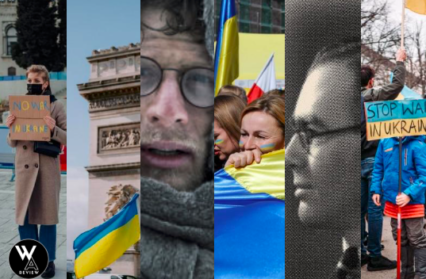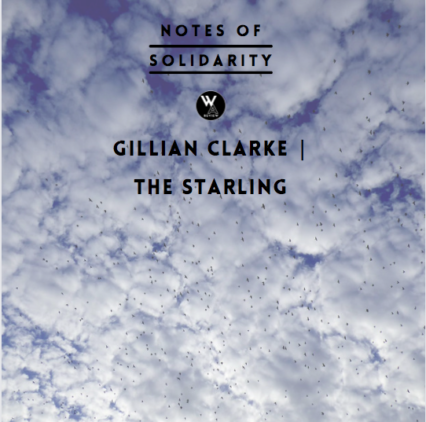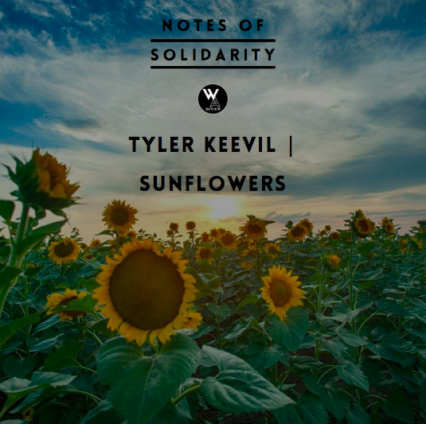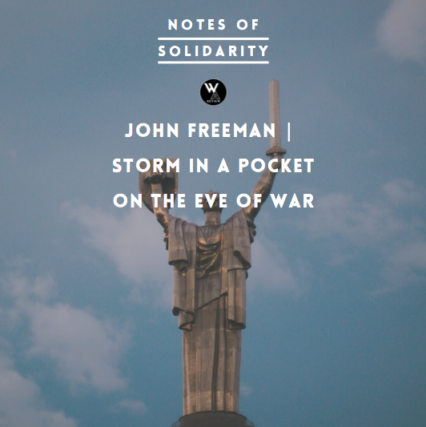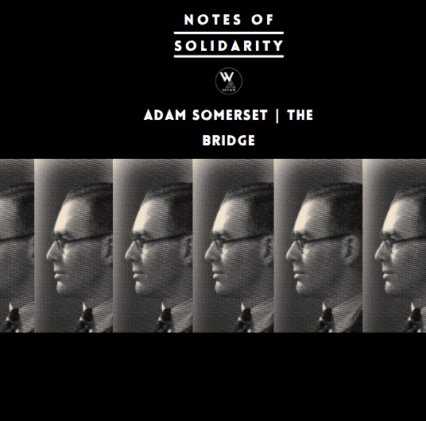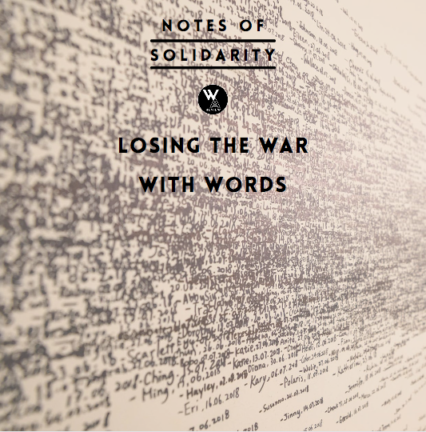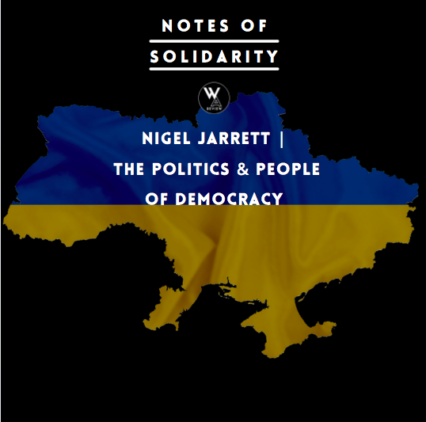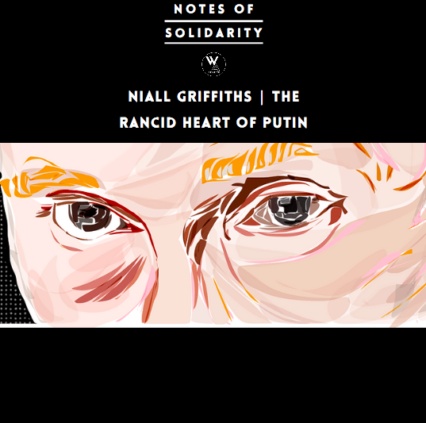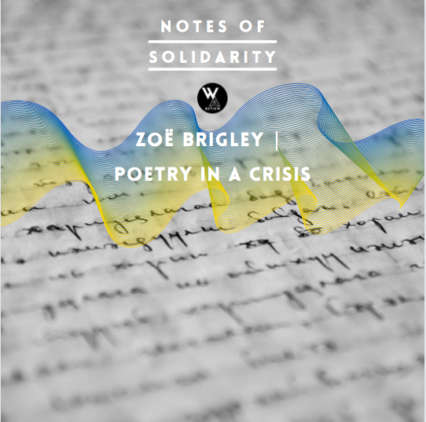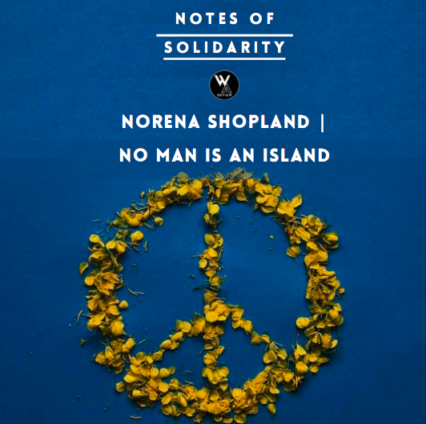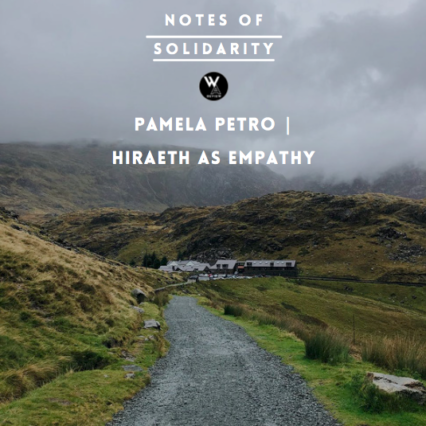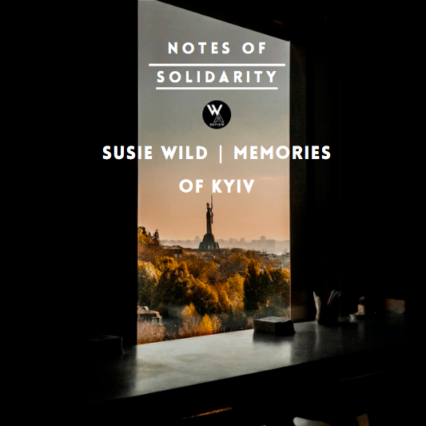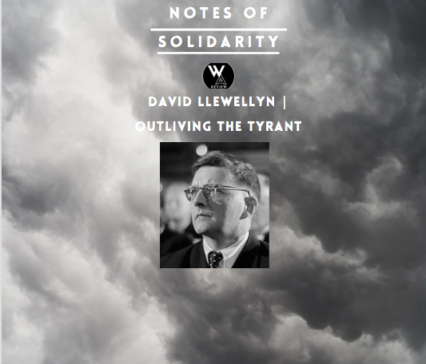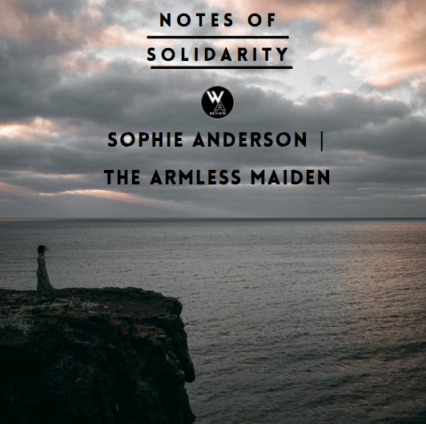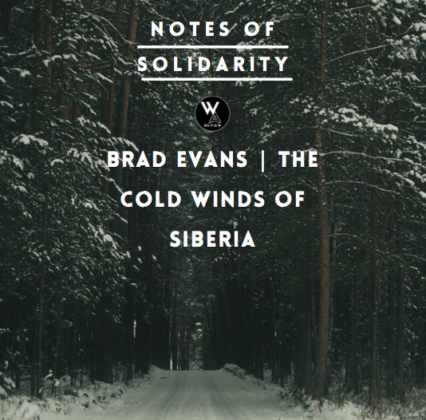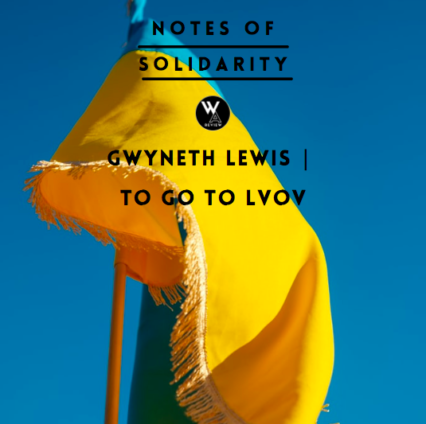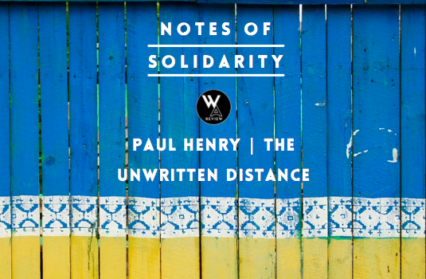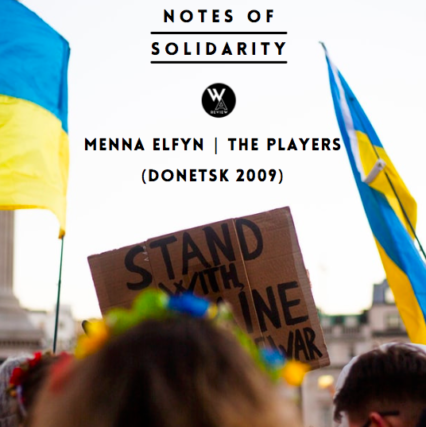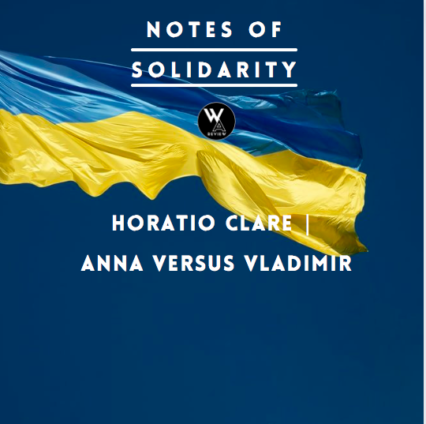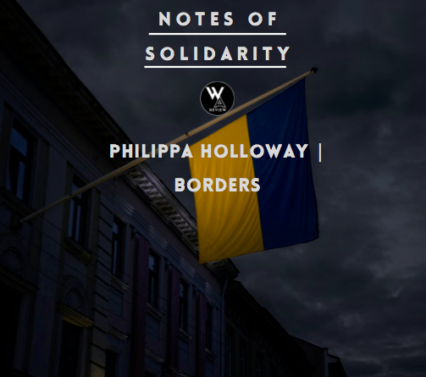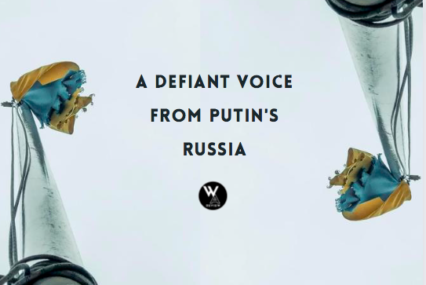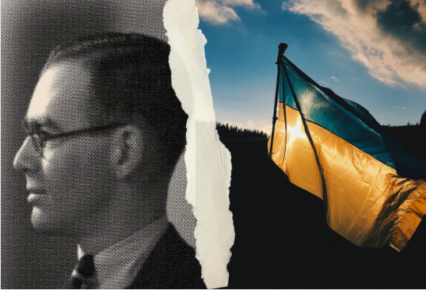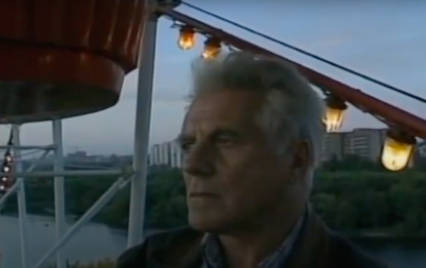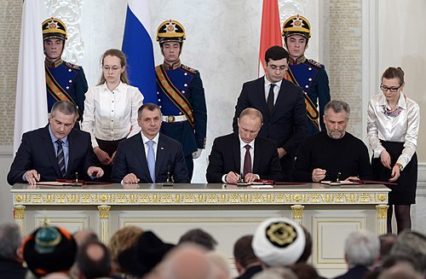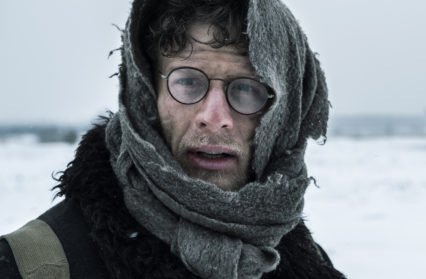With the situation in Ukraine still unfolding following Russia’s brutal and unlawful invasion, Wales Arts Review takes a look back at a few key pieces published over the last eight years, in addition to new pieces published in the wake of the war waged by Vladimir Putin. Covering everything from historic developments such as the Crimean crisis in 2014 and Polish director Agnieska Holland’s film on Welsh journalist Gareth Jones — through to messages of Ukrainian solidarity offered by a host of Welsh literary voices and a defiant voice from within Putin’s Russia. See the pieces below for Wales Arts Review‘s complete writings on Ukraine.
“You cradle the broken starling the cats caught / and brought home from the night. You heard it cry. / It trembles in your cupped hands, its heart wild, / beak parted, a star in its black eye.”
To close our series, we share a poem from playwright and former Welsh Poet Laureate, Gillian Clarke.
“She is ruminating, thinking aloud. You assure her that will never happen. You repeat that you will protect her, like a mantra. But the more you say it the less convincing it sounds.”
Author Tyler Keevil finds fear and hope in a tentative conversation with his daughter about the crisis in Ukraine. Read Tyler’s full piece here.
John Freeman | Storm in a Pocket On the Eve of War
“I don’t envy the Ukrainian soldiers / and civilians with sons and daughters, / fearful for their sake of the coming storm, / with Russian troops ‘on exercises’ – that’s what / some of them have been led to think they’re there for – /already starting to engage with shells, / armed preparations, and increasing tension.”
Award-winning poet John Freeman shares his poem ‘Storm in a Pocket On the Eve of War’. Read the full poem here.
“Gareth Jones catching a train from Moscow to Kharkiv. He slips off the train at an earlier stop and walks 40 miles to be witness to the Holodomor, the famine made in Moscow to starve the people of Ukraine.”
Adam Somerset recounts the power of Gareth Jones’ reporting on the Holodomor, the Terror-Famine which lasted in Soviet Ukraine from 1932 to 1933, killing millions of Ukrainians. Read Adam’s full piece here.
James Stafford | Losing the War with Words
“Apart from the usual impotence you feel upon discovering a friend is in a terrible situation in which there is little you can realistically do to help them, I also had to again face my inability to find the right words to even convey my support or my feelings. There she was telling me the horrendous life-changing decisions her family were having to make, and there I was having to keep reaching for the dictionary to even reply, let alone express my emotions.”
Author James Stafford writes on the difficulty and shame inflicted in being unable to find the right words in the face of tragedy and language barriers. Read James’ full piece here.
Nigel Jarrett | The Politics & People of Democracy
“Like other international conflicts, the invasion of Ukraine has two main components – the politicians and the people – and each is split into a myriad of other elements. Neither the Russian people nor the Ukrainian people want war. Successful Nazi propaganda in the second world war might convince us that all the German people supported Hitler and all Austrians supported Anschluss. Not so.”
Writer and critic Nigel Jarrett offers his thoughts on the histories and complexities of conflict and democracy. Read Nigel’s full piece here.
Niall Griffiths | The Rancid Heart of Putin
“He showed you the rancid heart of himself, time and again, and you continued to take his money. You knelt on the burnt corpses of innocents to lick his wallet and his playbook.”
Author Niall Griffiths tells of his rage towards Vladimir Putin and the establishment which has done nothing to stop him. Read Niall’s full piece here.
Zoë Brigley | Poetry in a Crisis
“Maybe the opposite of nature is war, because even while nature – it’s true – contains violence, it is human beings who have invented new forms of horror.”
Poet and writer Zoë Brigley writes on the power of poetry to offer evocative reflection and warning in the midst of a phenomenal crisis. Read Zoë’s full piece here.
Norena Shopland | No Man is an Island
“But there, there in the mud and the blood, the suffering, the deaths, and the world-felt pain, decency, morality, and humanity are surviving. We send our money, our clothes, medical supplies, we march, we write, we cry on platforms that stretch across the world.”
Author Norena Shopland writes on the strength of solidarity in the face of the great evil unleashed by Vladimir Putin. Read Norena’s full piece here.
Pamela Petro | Hiraeth as Empathy
“All I have to do is turn on my TV to see images from Ukraine—families going about their lives one day, invaded and bombarded the next, mourning, running for safety, running for cover, their homes, their cities destroyed and reduced to rubble all because they live in a country that shares a border with Russia.”
Pamela Petro considers the universality of hiraeth and how it might be a vehicle for empathy amidst the current crisis in Ukraine. Read Pamela’s full piece here.
“Above it all, the gothic green-domed St Andrew’s Church gleamed. A church without bells, because, according to local legend it is believed that if the bells sound, the seas will once again rise to the surface and flood the city.”
Poet, journalist and critic Susie Wild remembers a trip taken to Kyiv in 2005 which happened to coincide with the celebrations of the Eurovision song contest. Read Susie’s full piece here.
David Llewellyn | Outliving the Tyrant
“Joseph Stalin died on March 5th 1953, outliving many of the artists he persecuted. Dmitry Shostakovich went on to write another ten symphonies, and would later describe those years as ‘unbelievably mean and hard'”
Welsh novelist and script writer David Llewellyn reflects on the work of Dmitri Shostakovich, the Soviet-Russian composer who outlived Stalin. Read David’s full piece here.
Sophie Anderson | The Armless Maiden
“Why am I writing about a fairy tale when I have been asked to write about a war? Because when the world seems senseless, I find sense in the old tales. And this one in particular I often turn to in difficult times. The mutilation of the maiden and her subsequent journey can represent many kinds of trauma and healing. The path is not linear and even when safety is reached, there is more to endure.”
Children’s author Sophie Anderson tries to make sense of the senseless with a retelling of an ancient Russian fairy tale. Read Sophie’s full piece here.
Brad Evans | The Cold Winds of Siberia
“My attention is drawn to two classical artworks that defined the region. Creativity always managed to find a way, even in the most oppressive of states. Everything is in the eyes of the beholder. Have we not witnessed too much violence?”
political philosopher, critical theorist and writer Professor Brad Evans draws attention to two classical artworks which prove that creativity always finds a way, even in oppressive states. Read Brad’s full piece here.
“One day, in his poetry seminar at the Graduate Writing Division of Columbia University in New York, Joseph Brodsky interrupted his class to have us read a poem that had just been published in, I think, the Nation. It was written by a young Polish poet called Adam Zagajewski, whose work was just becoming known in America. The poem has been ringing in my memory since the Russian invasion of Ukraine.”
former National Poet of Wales Gwyneth Lewis recalls the legacy and power of the work of Adam Zagajewski. Read Gwyneth’s full piece here.
Paul Henry | The Unwritten Distance
“Fifty-six years after Akhmatova’s death, let us applaud then, at this dark time, the courage of all Eastern European poets, amongst them Aleksey Porvin, whose unwritten distances will add to her legacy.”
Poet and broadcaster Paul Henry explores the power and threat of poetry. Read Paul’s full piece here.
Menna Elfyn | The Players (Donetsk 2009)
“Today, the men are in tanks / and I’m back in Donetsk, giving thanks to a statue- / my compass at the crossroads. / I turn right; wave bore da to Lenin, / boorish from his dusting of snow.”
award-winning poet and activist Menna Elfyn brings us a poem recalling her time spent in Kyiv with the British Council in 2009. “I also spent time reading at Donetsk University where I spent a lovely week with students devising a Russian/Ukrainian Under Milk Wood with their own characters from various villages from the Crimea to Odessa. How I wish I had a recording of the performance we did.” Read Menna’s full piece here.
Horatio Clare | Anna Versus Vladimir
“It’s the Russian Joan Didion going to meet Himmler. He told her she should be shot. She described him as the Chechen Stalin. When it was done she was sure he would have her shot in the back. The bullets waited. She published the piece, allowing Ramzan to show himself in his own words as thick, evil, utterly Putin’s creature, deadly. She published so much and she must have known Vladimir would kill her for it.”
Horatio Clare writes on the remarkable Anna Politkovskaya, a Russian journalist, and human rights activist who was murdered by order of Vladimir Putin in 2006. Read Horatio’s full piece here.
“I stand on the cusp of out and in and think of borders, of language, of Welsh and Russian and English and Ukrainian words that elide within a single sentence and don’t define us as binary but quite the opposite, show us to be composite. I think hiraeth, toska, homesick, tuha za domom and they all feel the same. My body tells me this. I listen.”
The first in a daily series of mini-essays, poems, and reflections on the Russia war on Ukraine. Here, novelist Philippa Holloway, whose debut work, Half-life of Snails (Parthian, 2022), draws upon her psychogeographic research in the Chornobyl Exclusion Zone, examines her experiences between Ukraine and Ynys Mon. Read Philippa’s full piece here.
Alexey Porvin | A Defiant Voice from Putin’s Russia
“I am a citizen of a country whose government I did not elect, and this government has made a disastrous decision to invade the territory of a neighboring state. The most acute feeling of the inadmissibility of these actions came over me and millions of my compatriots, but the instruments of influence on the authorities and dialogue with them have been emasculated for a long time; today, there are no levers of influence on the authorities left.”
With Russia’s armed forces continuing to unleash devastating attacks upon Ukraine, it is becoming increasingly clear that Putin is in danger of fighting a war on two fronts. Anti-Putin sentiment is swiftly and mercilessly stamped down, with street protestors promised eight years behind bars. And so it is with great bravery that poet Alexey Porvin opened a dialogue with T.S. Eliot Prize-winning poet Philip Gross about a collection he has been working on for the last eight years focussing on Putin and Russia’s aggression toward Ukraine. Wales Arts Review is honoured to publish a selection of the poems with introductions from both Philip and Alexey. Read the full piece here.
On Gareth Jones – The Welsh “unsung hero of Ukraine”
“The facts of the Holodomor famine, which Jones observed and reported on first-hand, were slow to firmly enter recorded history. Over time it has become known that the starvation was politically motivated as part of the Sovietisation of Ukraine – the supply of food was not mismanaged, but weaponised. Survivors who spoke of the famine in the 1950s were largely dismissed as conspiracy-mongers.”
Adam Somerset highlights the life and work of Gareth Jones, the Welsh journalist celebrated in Ukraine for his reporting of the country’s deliberate starvation by the Soviet Union in the 1930s. Read Adam’s full piece here.
Hughesovka and the New Russia: Gwyn Alf Williams in Donetsk
“Williams goes on to trace, in his inimitable style, some of the parallels between his native South Wales and the Donbass region, all the while acknowledging that, for all the extreme poverty and radical politics in 1930s Wales, in Stalino – as the city was renamed in 1924 – the suffering was on a completely different level. Thousands died of starvation before Lenin’s New Economic Policy put mining, steelworking and education at the forefront of the city’s reconstruction.”
Dylan Moore, writing in 2014, revisits BAFTA Cymru-winning three-part documentary series Hughesovka and the new Russia which documented he history of one Ukrainan town founded in the 1870s by Welsh entrepreneur John Hughes. Read Dylan’s full piece here.
Russia: A Composite Review of Vladimir Putin’s Annexation of Crimea
“Independent voices in Moscow have been extinguished. The historian who pointed out the similarities of the statements behind Crimea’s annexation with Hitler’s seizure of the Sudetenland did not even last the day in his job. Ria Novosti, a news agency, has had a purge of its journalists and TV Rain, a private channel, taken off air by the main cable providers. New legislation is pushing yet further the splintering of the internet.”
Adam Somerset attempts to unravel the riddle of Vladimir Putin’s Russia following the annexation of Crimea in early 2014. Read Adam’s full piece here.
Mr Jones dir. Agnieska Holland | Cinema
“In the face of the silent horror of the Holodomor, Duranty’s decadent parties […] feel like an unnecessary distraction that jarringly contrast with the otherworldliness of Jones’s descent into Hell, for which he seems woefully ill-prepared. We then have to follow him back to Moscow, and to his native Barry, where it quickly becomes clear that the horrors he has seen have followed him.”
Marine Furet reviews Mr Jones, the new film from Polish director Agnieska Holland about the Welsh journalist Gareth Jones, who lifted the lid on Stalin’s genocidal starvation of Ukraine in the 1930s. Read Marine’s full piece here.
_______________________________________________________________________
Recommended for you:
Redux: Russia – Putin’s Annexation of Crimea


